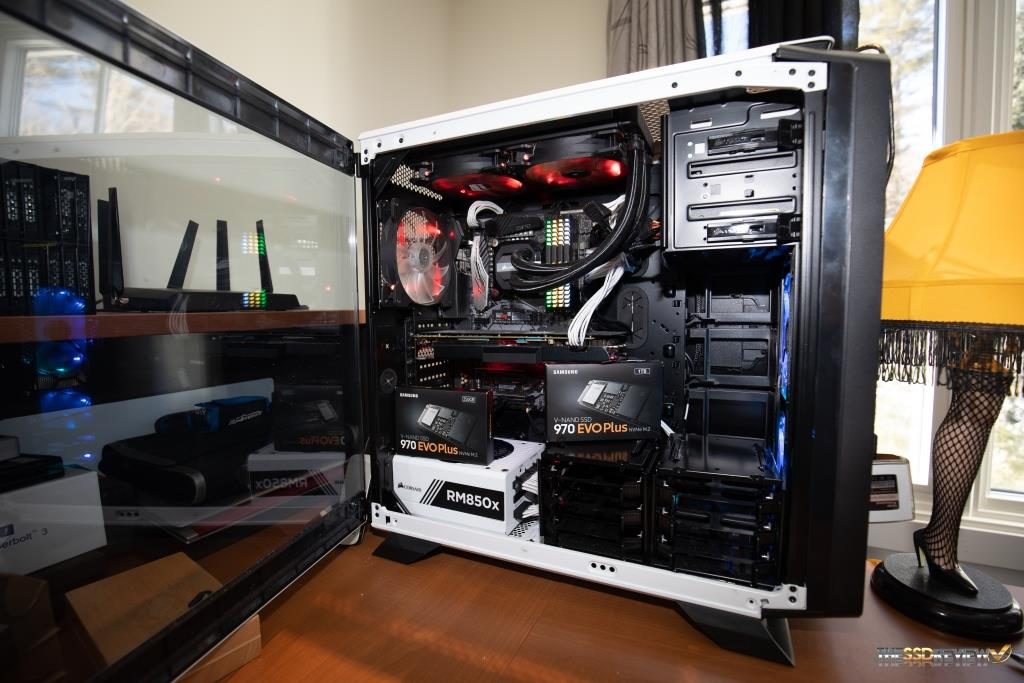TSSDR TEST BENCH AND PROTOCOL
SSD testing at TSSDR differs slightly, depending on whether we are looking at consumer or enterprise storage media. For our Samsung 970 EVO Plus testing today, our goal is to test in a system that has been optimized with our SSD Optimization Guide. To see the best performance possible, the CPU C states have been disabled, C1E support has been disabled, and Enhanced Intel SpeedStep Technology (EIST) has been disabled. Benchmarks for client testing are also benchmarks with a fresh drive so, not only can we verify that manufacturer specifications are in line but also, so those buying pre-built systems with the 970 EVO Plus can replicate our tests to confirm that they have an SSD that is top-notch. We even provide links to most of the benchmarks used in the report.
SYSTEM COMPONENTS
The components of this Test Bench are detailed below. All hardware is linked for purchase and product sales may be reached by a simple click on the individual item. As well, the title is linked back to the individual build article where performance testing can be validated.
TSSDR ASROCK Z370 TAICHI TEST BENCH (link)
| PC CHASSIS: | Corsair Arctic White Graphite 760T Chassis |
| MOTHERBOARD: | ASRock Z370 Taichi |
| CPU: | Intel Coffee Lake Core i7-8770K |
| CPU COOLER: | Corsair Hydro Series H110i GTX |
| POWER SUPPLY: | Corsair RM850x 80Plus |
| GRAPHICS: | PNY GTX 1080 XLR8 Gaming OC |
| MEMORY: | Corsair Dominator Pl 32GB 2800 |
| STORAGE: | Intel Optane 900P 480GB SSD |
| KEYBOARD: | Corsair Strafe RGB Silent Gaming |
| MOUSE: | Corsair M65 Pro Gaming |
| OS | Microsoft Windows 10 Pro 64 Bit |
BENCHMARK SOFTWARE
The software in use for today’s analysis is typical of many of our reviews and consists of Crystal Disk Info, ATTO Disk Benchmark, Crystal Disk Mark, AS SSD, Anvil’s Storage Utilities, AJA, PCMark Vantage, PCMark 8, TxBench, as well as true data testing. Our selection of software allows each to build on the last and to provide validation to results already obtained.
CRYSTAL DISK INFO VER. 7.5.0
Crystal Disk Info is a great tool for displaying the characteristics and health of storage devices. It displays everything from temperatures, the number of hours the device has been powered, and even to the extent of informing you of the firmware of the device.
Crystal DiskInfo shows us that the SSD is operating in PCIe 3.0 x4 and using the NVMe 1.3 protocol.
ATTO Disk Benchmark is perhaps one of the oldest benchmarks going and is definitely the main staple for manufacturer performance specifications. ATTO uses RAW or compressible data and, for our benchmarks, we use a set length of 256mb and test both the read and write performance of various transfer sizes ranging from 0.5 to 8192kb. Manufacturers prefer this method of testing as it deals with raw (compressible) data rather than random (includes incompressible data) which, although more realistic, results in lower performance results.
The Samsung 970 EVO Plus 1TB M.2 NVMe SSD reaches 3..5GB/s read and 3.1 GB/s write disk transfer speeds and this same test on the 250GB version resulted in 3.5GB/s read and 2.3GB/s write.
 The SSD Review The Worlds Dedicated SSD Education and Review Resource |
The SSD Review The Worlds Dedicated SSD Education and Review Resource | 


I recently bought the 970 Evo 500GB, but haven’t used it yet, and it’s still in the window of time to return it. I’m considering returning it and getting the Plus 500GB. Are there any areas where the previous 970 is better than the Plus ?
Sorry…no. The Plus is an amazing SSD.
Just wondering would the 1TB 970 Plus best my relatively new 970 Pro in terms of overall read/write performance?
If only their QLC drives were that good 🙂
Hello, What are actual NAND erase block and NAND page sizes? 1536kb/8kb or different?